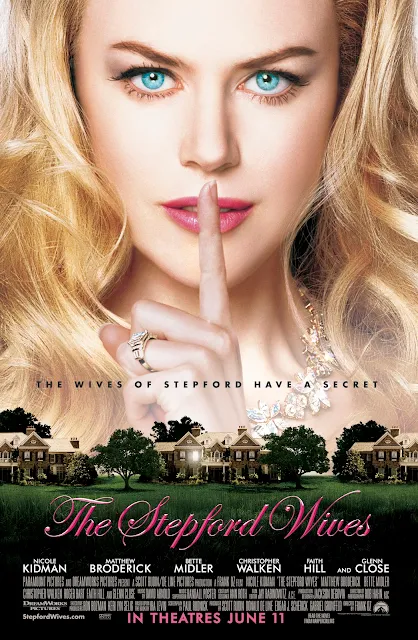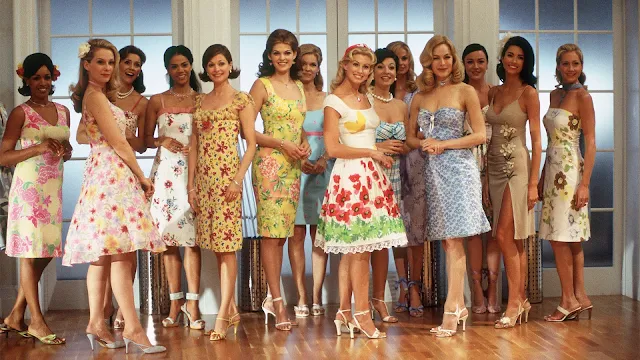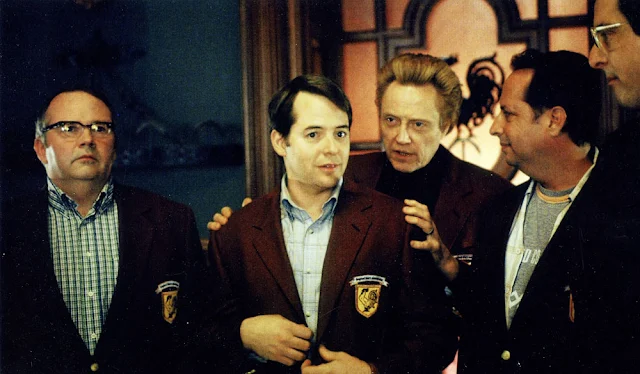





 Cast: Nicole Kidman, Matthew Broderick, Bette Midler, Glenn Close, Christopher Walken, Roger Bart, David Marshall Grant, Jon Lovitz, Dylan Hartigan, Faith Hill, Fallon Brooking, Matt Malloy. Screenplay: Paul Rudnick, based on a novel by Ira Levin. Cinematography: Rob Hahn. Production design: Jackson De Govia. Film editing: Jay Rabinowitz. Music: David Arnold.
Cast: Nicole Kidman, Matthew Broderick, Bette Midler, Glenn Close, Christopher Walken, Roger Bart, David Marshall Grant, Jon Lovitz, Dylan Hartigan, Faith Hill, Fallon Brooking, Matt Malloy. Screenplay: Paul Rudnick, based on a novel by Ira Levin. Cinematography: Rob Hahn. Production design: Jackson De Govia. Film editing: Jay Rabinowitz. Music: David Arnold.
A blog formerly known as Bookishness / By Charles Matthews
"Dazzled by so many and such marvelous inventions, the people of Macondo ... became indignant over the living images that the prosperous merchant Bruno Crespi projected in the theater with the lion-head ticket windows, for a character who had died and was buried in one film and for whose misfortune tears had been shed would reappear alive and transformed into an Arab in the next one. The audience, who had paid two cents apiece to share the difficulties of the actors, would not tolerate that outlandish fraud and they broke up the seats. The mayor, at the urging of Bruno Crespi, explained in a proclamation that the cinema was a machine of illusions that did not merit the emotional outbursts of the audience. With that discouraging explanation many ... decided not to return to the movies, considering that they already had too many troubles of their own to weep over the acted-out misfortunes of imaginary beings."--Gabriel García Márquez, One Hundred Years of Solitude
Search This Blog
Showing posts with label Glenn Close. Show all posts
Showing posts with label Glenn Close. Show all posts
Saturday, January 4, 2025
The Stepford Wives (Frank Oz, 2004)
Monday, February 17, 2020
Dangerous Liaisons (Stephen Frears, 1988)
 |
| Michelle Pfeiffer and John Malkovich in Dangerous Liaisons |
"Wicked" is a word that has lost a good deal of its pejorative quality, and not just in Boston where it became slang meaning "excellent." There's an attractive quality to wickedness that's lacking in words like "evil." Which is not to say that the wicked pair of the Marquise de Marteuil (Glenn Close) and the Vicomte de Valmont (John Malkovich) aren't reprehensible, but that they fascinate us with their sly wit and determined pursuit of their aims. Close in particular makes the marquise so delicious that there's a considerable shock when she self-destructs upon the failure of her plans, and perhaps the audience even has a glimmer of pity for her final comeuppance. The choice of Malkovich to play Valmont was controversial: He's an actor known for eccentric roles, not the type for a suave seducer. And yet he gives Valmont a snake-like fascination -- so snaky that at one point he even hisses at Swoosie Kurtz's Madame de Volanges -- that makes his conquests of Uma Thurman's Cécile and Michelle Pfeiffer's Madame de Tourvel plausible. He also brings out the vulnerable side of Valmont, so that we find it credible that this implacably rakish figure could find himself undone by this conquest of Madame de Tourvel. But then again, who wouldn't find themselves undone by Michelle Pfeiffer, then at the early peak of her career? In casting Dangerous Liaisons, Stephen Frears followed the lead of Milos Forman, who cast Amadeus (1984) with American actors instead of the British ones usually called on for costume dramas set in Europe, a move that shocked some critics -- especially the British. (The exception in Dangerous Liaisons is Peter Capaldi as Valmont's henchman Azolan, and his Scottish accent stands out oddly.) The irony here is that Forman was at work on his own version of the Choderlos de Laclos novel, called Valmont (1989), which was doomed by being released a year after Frears's film. Dangerous Liaisons won Oscars for Christopher Hampton's screenplay, Stuart Craig's art direction and Gérard James's set decoration, and for James Acheson's costumes. Close and Pfeiffer were nominees, as was George Fenton for a score that blended nicely with excerpts from Vivaldi, Handel, Bach, and Gluck.
Friday, October 11, 2019
Cookie's Fortune (Robert Altman, 1999)
Cookie's Fortune (Robert Altman, 1999)
Cast: Charles S. Dutton, Glenn Close, Julianne Moore, Liv Tyler, Patricia Neal, Chris O'Donnell, Ned Beatty, Courtney B. Vance, Donald Moffat, Lyle Lovett, Danny Darst, Matt Malloy, Niecy Nash, Randall Mell, Rufus Thomas, Ruby Wilson. Screenplay: Anne Rapp. Cinematography: Toyomichi Kurita. Production design: Stephen Altman. Film editing: Abraham Lim. Music: David A. Stewart.
Cookie's Fortune is one of Robert Altman's lesser-known movies, but it's an eminently likable one, a comedy about that familiar literary trope, the dysfunctional Southern family. It's set in the picturesque small North Mississippi town of Holly Springs, which I know well because it was on the way from Oxford to Memphis back when there were no four-lane roads to travel on. In the film, it's a place with no apparent racial tensions: When a black man, Willis Richland (played by the great Charles S. Dutton), is arrested for the murder of elderly Jewel Mae "Cookie" Orcutt (a wonderful performance by Patricia Neal), the white sheriff refuses to believe he did it: "I've fished with him," he explains to the skeptical out-of-town forensics expert. Altman and screenwriter Anne Rapp simply choose not to make racial animosity a factor in their story, which is really about how difficult it is to keep secrets in a place as small and as nosy as Holly Springs and its like. Cookie's death is actually a suicide, but her niece Camille (Glenn Close), who discovers the body, chooses to cover it up -- actually eating the suicide note, which is not addressed to her -- because (a) the fact of suicide would cause a scandal in the town and (b) she stands to inherit as the next-of-kin to Cookie, assuming there's no will. (There is, but she doesn't find it in the cookie jar where it's hidden.) Camille enlists her rather slow-witted sister, Cora (Julianne Moore), in the cover-up. But suicide will out, as well as lots of other family secrets. All of this is taking place over Easter weekend, when Camille's production of Salome -- by Oscar Wilde and Camille Dixon, as the poster says -- is being staged in the local First Presbyterian Church, starring Cora in the title role. Cookie's Fortune is a charming film, carried along by a cast that Altman stands out of the way of and lets do their thing.
Subscribe to:
Comments (Atom)









